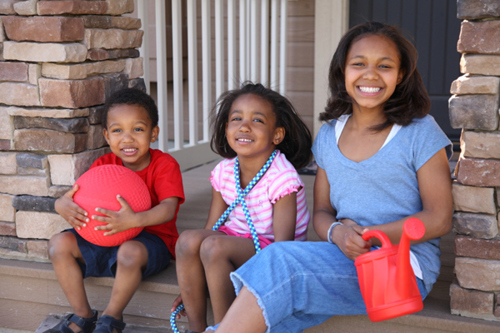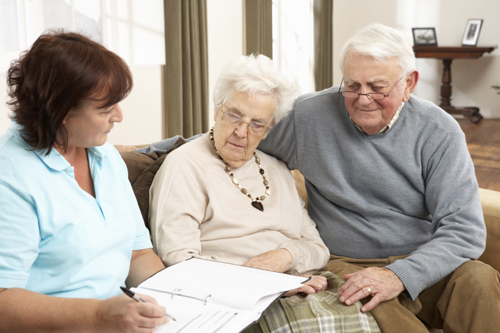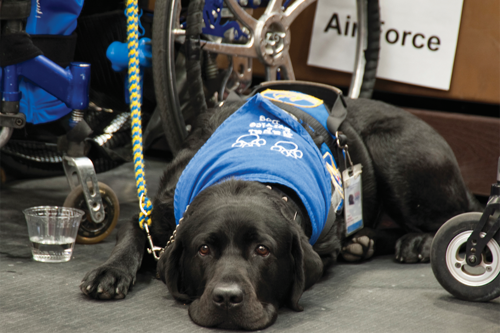Family & Special Needs
All residents should have a plan. Emergencies happen when we don't expect them, and often when families are not together.
Suddenly, you need to think about your kids at school or elderly parents across town. If phones don't work, or some neighbourhoods aren't accessible, what will you do?
Having a family emergency plan will save time and make real situations less stressful.
Things to think about:
Where will you meet, how will you communicate?
Create your own Family Action Plan online at Emergency Management Ontario or Print and fill out the Family Emergency Plan Worksheet

Children

Pets

Seniors

Special Needs
Get prepared! A safe start back to school
With a new school year now underway, families should take the time to talk to their children about school safety and emergency planning. Here are four areas to focus on:
Check your family emergency plan and emergency kit supplies
Get your kids involved in making your family emergency plan and emergency kit. Talk about what to do and where you will meet if you are not together when an emergency takes place.
Help your children prepare for emergencies
Teach them about natural hazards like tornados, severe thunderstorms and blizzards. To help reduce panic or anxiety in an actual emergency, familiarize kids with emergency procedures like taking shelter or evacuation.
Know your school’s emergency procedures
Read information from the school about its plan for emergencies, and check that the school has your updated emergency contact information, including work, mobile and home numbers.
Teach your child how to use 9-1-1
Explain when to use it and what information to give if they call 9-1-1. Help your child memorize the full name, address, and phone numbers of parents or caregivers. Include a copy of this information in their backpack.
Children
During an emergency situation, it's important to remember that your child looks to you for guidance and comfort.
Remember that:
- Children follow their parent’s lead – the calmer you are, the calmer they will be.
- It's important to talk to them openly and honestly about what is happening. Try to explain the nature of the problem in a way they'll understand. Ensure them that everything is under control.
- Never dismiss their fears or anxieties. You should try to monitor what they watch on television (news coverage of certain emergency situations can be distressing for children).
- If you must evacuate, bring a toy along (or a favorite board game); this may help to keep them occupied and provide them with additional comfort.
Disaster Planning for Your Pet
The first rule to remember is if it’s too dangerous for you to stay, it’s too dangerous for your pet to stay. Proper planning and making arrangements before an emergency will increase your pet’s chances for survival and ability to cope.
- Pets should not be left in an empty house or to roam free. Animals turned loose to fend for themselves are likely to become victims of starvation, predators, contaminated food or water, or accidents.
- If you board your pet at a kennel facility, reclaim your pet as quickly as possible because chances are, the facilities will be overcrowded and understaffed.
- The first couple of days following the disaster, be sure to put a leash on your pets when they go outside until they become familiar with their home again.
- Familiar scents and landmarks may be altered and your pet may become confused and lost.
- The behavior of your pets may change after an emergency; normally quiet and friendly pets may become aggressive or defensive.
- It’s also important to keep a close eye on pets outside due to possible hazards of downed power lines.
- Be alert for rotted substances that your pet may find when released into your yard.
Seniors and Emergencies
It's important that seniors be prepared for emergencies. Your emergency plan should reflect your personal circumstances and unique needs. In addition to the basic emergency survival kit, it is essential that you consider specific essentials such as medications, walkers or other equipment that you depend on.
Family members and/or friends should always have a copy of your emergency plan and be made aware of any of your special requirements.

Key areas to consider for seniors
- Assistive devices such as canes, walkers, hearing aids, breathing apparatus, etc. Have an emergency back-up plan for any electrical devices in the event of a power outage
- All prescription eyewear and footwear, extra medication and vitamin supplements
- Extra dentures and cleanser
- Personal papers, identification, and copies of prescriptions
- List of names and telephone numbers (such as family members, doctor, case worker, seniors’ group contact person, etc.)
- Always wear your MedicAlert® identification
You will also want to make sure that:
- You include your support network in the development of your plan so they will know where you will go in case of an emergency. Arrange for someone to check up on you who has a key and knows where your emergency survival kit is stored. Teach members of your support network how to use any necessary equipment and administer medicine.
- Consider an emergency plan for any routine treatments or home care by talking to your service provider.
- Identify back-up service providers and incorporate them into your personal support network.
Special Needs
In a disaster, people with special medical needs have extra concerns. Be aware that experiencing an emergency can be overwhelming and stress can worsen some medical conditions.

For more information download the Emergency Preparedness Guide for People with Disabilities/Special Needs.
Take the following steps if you or your family members have special medical needs:
- Make sure all your emergency kit items are labelled, organized in one place, are easy to find and to carry.
- Include instructions on how to use and/or move each assistive device during an emergency. Check with your medical supply company and get information regarding a back-up power source for electric medical equipment like beds, infusion pumps, and breathing equipment.
- Keep an emergency contact list of key people aware of your special needs on your person.
- Have an extra three-day supply of any medical supplies you use, such as oxygen tanks, bandages, syringes, insulin, medications, or prescription eyewear.
- List all food/drug allergies and current medicationsin your emergency kit. Also keep copies of vital medical papers, like insurance details and power of attorney.
- Consider wearing a MedicAlert bracelet or identification to help notify emergency responders about your special needs.
- If hearing impaired, determine how you will communicate with emergency personnel if there is no interpreter or if you don’t have your hearing aids, such as a notepad and pen.
- Service animals may become confused, frightened or disoriented during and after a disaster. Keep them confined or securely leashed or harnessed.